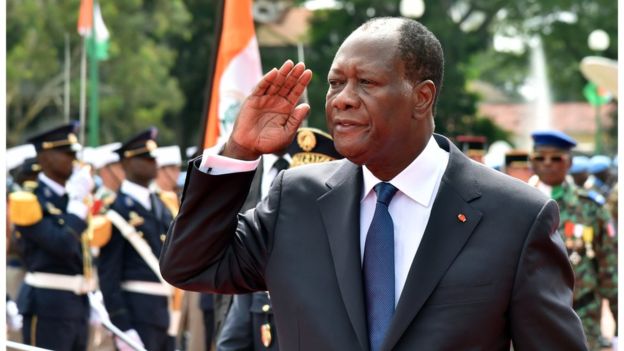
The Republic of Ivory Coast

Brief Overview
Côte d’Ivoire is a West African country with beach resorts, rainforests and a French-colonial legacy. Abidjan, on the Atlantic coast, is the country’s major urban center. Its modern landmarks include zigguratlike, concrete La Pyramide and St. Paul’s Cathedral, a swooping structure tethered to a massive cross. North of the central business district, Banco National Park is a rainforest preserve with hiking trails.
Political Context
Although Côte d’Ivoire has regained stability since the end of the 2010-2011 post-electoral war, the approach of the 2020 presidential election is giving rise to some uncertainty. President Alassane Ouattara has not yet indicated whether he will seek a third term.
Former president Laurent Gbagbo was acquitted by the International Criminal Court but granted conditional release pending appeal proceedings. Upon completion of these proceedings, he could possibly join the presidential race. Recent tensions within the ruling RHDP coalition have culminated in the resignation of the speaker of the Parliament, Guillaume Soro.
A new independent electoral commission (CEI), tasked with organizing the upcoming elections, was established following discussions between the government and an opposition party. The Parti Démocratique de Côte d’Ivoire (DCI) led by Henri Konan Bédié and the Front populaire ivoirien (FPI), led by Laurent Gbagbo, as well as parties close to the former speaker of the Parliament, Guillaume Soro, did not participate in the discussions. They are calling for new talks related to overhaul of the CEI.
Intercommunal confrontations in May in the central region of the country and the recent arrest of political opponents followed by clashes between law enforcement and demonstrators are raising fears of heightened political tensions with the approach of the presidential election scheduled for October 2020.
Economic Overview

The Republic of Ivory Coast
Capital: Yamoussoukro
Population 23.7 million
Area 322,462 sq km (124,503 sq miles)
Major languages French, indigenous languages
Major religions Islam, Christianity, indigenous beliefs
Life expectancy 52 years (men), 55 years (women)
Currency CFA (Communaute Financiere Africaine) franc
UN, World Bank

Social Context and Development Challenges
It would be to the advantage of Côte d’Ivoire to target the most vulnerable segments of the population for greater redistribution of the benefits reaped from its sound economic performance, to further integrate women into the economy, and to develop its human capital to better meet the needs of the labor market.
The production of modern goods and services requires skills that are still lacking in the local labor force.
Physical Contacts of the Presidency
Name of Minister:
Address:
Telephone:
Fax:
Physical Contacts of the Prime Minister’s Office
Name of Minister:
Address:
Telephone:
Fax:
Physical Contacts of the National Assembly
Name of Speaker of the House:
Address:
Telephone:
Fax:
Physical Contacts of the Chief Of State and Cabinet Ministers
Name of Minister:
Address:
Telephone:
Fax:
Physical Contacts of the Ministry of Interior
Name of Minister:
Address:
Telephone:
Fax
Physical Contacts of the Ministry of Justice
Name of Minister:
Address:
Telephone:
Fax:
Physical Contacts of the Ministry of Foreign Affairs
Name of Minister:
Address:
Telephone:
Fax:
Physical Contacts of the Ministry of Women’s Affairs
Name of Minister:
Address:
Telephone:
Fax:
Physical Contacts of the National Human Rights Commission
Name of Minister:
Address:
Telephone:
Fax:
Physical Contacts of the Police
Name of Inspector General:
Address:
Telephone:
Fax:
Physical Contacts of the Military
Name of Inspector General:
Address:
Telephone:
Fax:
Important Information of Key Human Rights Issues in The Republic of Ivory Coast
Number Prisons in The Republic of Ivory Coast
Number Prisoners in The Republic of Ivory Coast
Secret Detention Centres:
Police Stations in The Republic of Ivory Coast
Corruption in The Republic of Ivory Coast
What are the current and ongoing human rights issues in The Republic of Ivory Coast
(1) Freedom of the Press
(2) Human Rights Defenders Issues
(3) Impunity
African Union (AU)
Joined the OAU
Signed the Constitutive Act of The African Union on:
Ratified:Instrument Deposited:
Signed:
Ratified:
Instrument Deposited:
Signed:
Ratified:
Instrument Deposited:
Signed: –
Ratified: –
Instrument Deposited: –
4.Protocol on Amendments to the Protocol on the Statute of the African Court of Justice and Human Rights
Signed: –
Ratified: –
Instrument Deposited: –
Signed: –
Ratified: –
Instrument Deposited: –
Signed: –
Ratified: –
Instrument Deposited: –
Signed: –
Ratified: –
Instrument Deposited: –
Signed: –
Ratified: –
Instrument Deposited: –
Signed: –
Ratified: –
Instrument Deposited: –
Signed: –
Ratified: –
Instrument Deposited: –
Signed: –
Ratified: –
Instrument Deposited: –
Signed: –
Ratified: –
Instrument Deposited: –
Signed: –
Ratified: –
Instrument Deposited: –
Signed: –
Ratified: –
Instrument Deposited: –